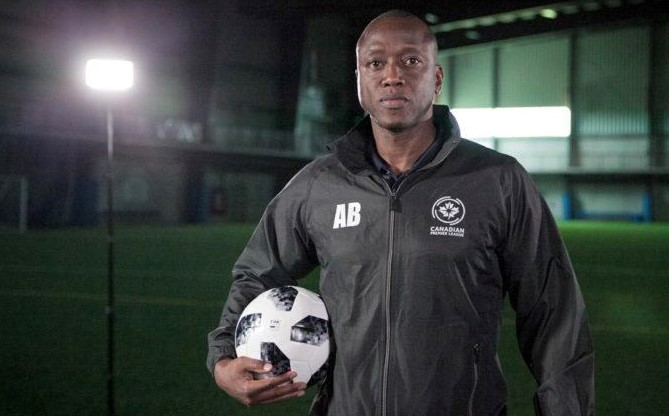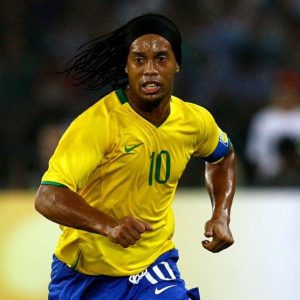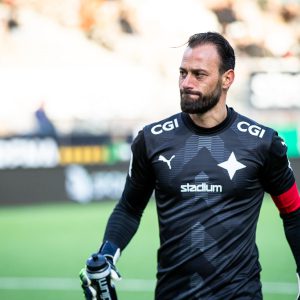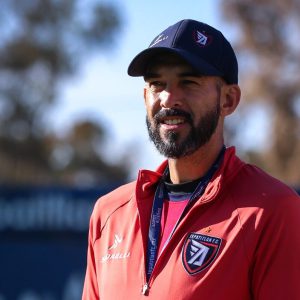

Alex Bunbury: “I would love to be part of a big club in Portugal”
Alex Bunbury is a Canadian former International football player. Born in Plaisance, Guyana, Alex was the first Canadian playing abroad and represented clubs such as West Ham and Marítimo, where he became the club’s all-time leading goalscorer. During this interview conducted by Nuno Milheiro, the former striker reveals to us his first steps as a footballer, his arrival in Europe, and his post-career steps, reflecting on leadership and the current state of Canadian football.
In a country strongly dominated by hockey, Alex’s passion for football arose at a quite late age. “Football was not the number one sport in Canada. It was hockey, by far, and I grew up playing hockey. My older brothers played football and got me involved in the sport at the age of 12. There was something about it that gravitated to my personality and the rest is history. I worked hard, had really good coaches, and played with a lot of good players that enabled me to improve holistically in the game. I ended up being a professional football player for a long time and I am grateful”, he stated.
His first professional team was Hamilton Steelers. In 1992, he left Montreal Supra to embark on his first adventure in Europe, joining West Ham. “It was not an easy journey. I played in that league for like four years and thought I could play at a higher level. I am not trying to knock the Canadian Soccer League, because it was a good league and taught me how to be a professional. I felt that I could go further and decided to try out in Le Havre, in France. Graham Rix played there and introduced me to Liam Brady, who was coach at Celtic, so I went from Le Havre to Scotland. It did not work out there. I went from Scotland to England and I ended up signing for West Ham United after I played in the World Cup Qualifiers. I scored three goals in the game against Bermuda and that was something that helped propel me to get the contract. It was incredible! A 5-year contract. What a dream”.
The opportunities to play at West Ham were scarce and he felt he needed to play more regularly. That is how, in the 1993-1994 season, Alex decided to sign for Marítimo, in Portugal.
At the time, we had a lot of Word Cup qualifying games for Canada and fortunately that meant that I had to travel back to Canada on numerous occasions. The manager at the time was Billy Bonds and the assistant manager coach at the time was Henry Redknapp. They called me into the office and said: “You have to choose: club or country”.
I am loyal to the country that gave me and my family so much. I told them “country” and they were not pleased with that answer. I did leave to go to the qualifying games and when I came back it was very difficult. I needed to move on because I could not showcase my talent. I was fortunate to have a mutual friend who was a friend of [the coach] Edinho. He found out about my situation and asked the mutual friend “Would Alex like to go to Madeira?”. I have to be honest. My first thought was “I don’t want to go to Portugal and play”. Things did not get any better and I finally decided to go to Madeira. The landing, when I was on the plane, oh my gosh… As we were coming down, I looked at the island. It was incredible how beautiful it was. Right away I wanted to stay and the rest is history. I ended up signing with Marítimo. It was the best thing that ever happened to me outside of my family, my immediate family, my kids, and things of that nature. They will always be in my heart”.
In the 1994-1995 season, Alex had the opportunity to face the Juventus of Gianluca Vialli and Roberto Baggio, who praised his performance inside the pitch.
One of the compliments I have ever had as a player was when Gianluca Vialli talked to me after the game and said “You are a great player”, after the first game we played. Then Baggio, when we exchanged jerseys, said “You are an excellent player”. At that time, Vialli and Baggio were incredible players. We played against them and I can tell you how good the team we had was! Great coaching, leadership, and supporters. Just talking about it I get excited again. I had a great coach like Paulo Autuori, great teammates like Vado, Paulo Alves, Edmilson, and a great president, Rui Fontes. I would love to see Marítimo go back to those glory days and I think they can. I know they can”.
After finishing his 13-year career, he started two youth development programs. The first, named Escola Futebol da Madeira, was based in Portugal, and the other in Minnesota, in the United States of America. “I have always believed in youth development. So, in the island Madeira, along with João Luís, Luís Manuel, and other players, we started the Escola Futebol da Madeira. We brought young people in and worked with them, showing other things outside football. We took them around the island and did carting, horseback riding… And then we brought football, the thing that they love, into the focus. When I retired from football I started my youth development program here [in the state of Minnesota] and it has grown over the years. That is what I have been doing for the past 20 something years. It is giving back to young people, especially those with low income, underprivileged. We give them a great opportunity to be in an environment where they can learn not only how to play football. They can learn about social things, how to take care of themselves, how to be disciplined, how to make commitments, how to focus on Academics… So we put together a holistic approach for youth development”.
The former striker also had an experience as a club owner in 1.º de Dezembro and strongly believes in the player development system in Portugal.
“First of all, I believe that Portugal has the best system of developing players. When you look across the globe at clubs at the highest level you can almost find a Portuguese player in every club. And when you think of the players that came out of the youth development system in Portugal… Futre, Luís Figo, Cristiano Ronaldo, Paulo Sousa… It is endless, right? So there is something about the way they are taught to play the game in Portugal.
I played in the [Portuguese] league and it prepares you to play in any league of the world. Because of that, I wanted to get involved and invest in a club. Things happened and I needed to come out because I had other things going on. But that was a great experience, with 1.º de Dezembro, and when things are settled down here again I would love to be part of a big club in Portugal. And the big club of course would be the club of my heart. Everyone knows which club is. It is a great club, with a great tradition, on a beautiful island… What a dream come true it would be”.
In his opinion, the key point that small and medium clubs must improve internally to allow them to get closer to success is community engagement. “You have to have people who have passion and love for the community. The team does represent the community. Then, you also have to implement a youth development program that gives you that feeder system in which moms and dads want to come and watch their kids. They are going to come and support the team. You have to have a family and entertainment. You also have to have good players to perform on the field, because people want to come and see success. This is for the players and supporters”.
He thinks that a club president should always remain in the shadow and away from the spotlight.
He can never be the main focus of the club. The game is for the players. The president is there to be a leader and to implement things that will make the club successful off the field. And also to work with the management and the coaches to bring in the best players he can bring in to make sure that the club is successful. The president should not be the focal point of the process”.
Alex believes that the staff, in their multiple departments and hierarchical levels, is crucial for achieving the club’s goals. “Even in my business, I bring people along who are smarter than me. That is great leadership. If you think you are smart in every area, you will never be successful. Maybe for a moment, yes, but after a while, it deteriorates. A great leader puts the right people in the right position to do their job. I think every club has to understand the importance of having good people. People with integrity. Good character. People that are willing to say “no, that is not how we should do it” when that is the case. Every club that follows that pattern is usually very successful. Now, how do we judge success? Success is being able to put together a club that represents your community, your supporters, and your characteristics. Sometimes we tend to think that success is all about winning. Yes, at a professional level winning is very important. But there is more to it than just winning. You have to have a good front office. Your equipment man or women has to be good. All these people need to be appreciated and acknowledged for the job they do. [In Marítimo] We did a great job because Paulo Autuori was very adamant. We were one family, and he was blessed to be the leader”.
He also considers the scouting area decisive for the clubs’ success. “You have to have it. There is scouting and recruiting. I think that scouting is more important than recruiting. You can recruit someone but scouting means you have invested in that individual. You have taken the time and know everything about that person, his character, how is he going to fit into the group… It is not only about the ability. Scouting for me is vital”, he admits.
Recently, Alex was involved in the initiation of the new Canadian Soccer League, which can be a fruitful platform for young talents. “I was an ambassador and went from the east to the west coast promoting the league. The response that I got from the people and all of the provinces that we went to was incredible. They wanted it badly: Canada to have its own identity to allow young players to play in a professional environment that can propel them to go play in Portugal, England, or Germany. Unfortunately, there was a bit of a setback with COVID-19, but the Canadian Premier League has been very successful in its first year. David Clanachan and all the staff have done a fantastic job in implementing the league with all of the owners who have invested and taken the risk doing that”.
In a near future, he believes that Canada will be able to participate in the World Cup and compete along with the best football nations in the world. “Look at Alphonso Davies. We have some talented players. Very young players that are playing in Europe and doing well. They are not going to be intimidated by playing against other countries like the United States of America, Jamaica, or Mexico. I see them playing in the World Cup very, very soon”, he concluded.
Get to know more about Soccer HUB!
Follow us on Facebook!
Leave A Reply Cancel reply
You must be logged in to post a comment.
Categories
Latest Courses
-
9 Lessons
-
1 Lesson
-
6 Lessons
You May Also Like
- Blog
- August 1, 2022
- Blog
- June 3, 2022
- Blog
- May 27, 2022
Developed by Brandit Digital Media Services.






1 Comment
Grandissimo jogador que foi o Alex!!!!! Nenhum maritimista pode dizer o contrário!! Jogador de fibra que apesar de não ser madeirense sentia como poucos a camisola que vestia!! Muitas saudades de vê-lo jogar. Infelizmente hoje o clube enveredou por “outros caminhos”. Se calhar com o amor que ainda sente pelo Marítimo deveria estar num lugar de destaque na Direção. Sendo gestor… porque não Presidente? Uma presidência onde o presidente não concentrasse tanto poder e soubesse delegar em pessoas competentes e que gostassem verdadeiramente do clube. Exatamente o contrário do que se verifica agora